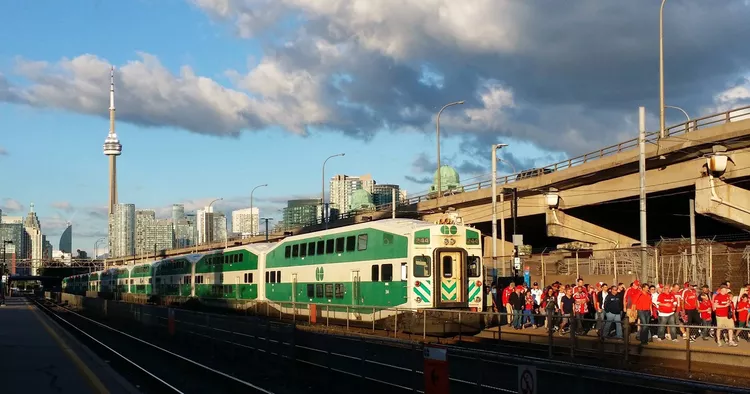A guide to getting started on GO Transit
Are you new to GO Transit or just need a refresher on using GO trains and buses in and around the city? Use this beginner’s guide to introduce yourself to the public transit system that can connect you to Ontario destinations beyond Toronto’s borders, whether commuting for work, traveling for pleasure or simply getting from point A to B using the service.
What is GO Transit?
GO Transit is a public transit system, which is a division of the provincial government agency, Metrolinx. GO Trains and buses connect Toronto with numerous other municipalities in the Greater Toronto Area and Hamilton and carry over 70 million passengers a year.
Where Does GO Transit Go?
GO Transit routes radiate out from Toronto’s Union Station. The GO Train lines reach out to Hamilton, Milton, Kitchener, Barrie, Richmond Hill, Lincolnville, Oshawa, and – seasonally – Niagara Falls. Bus routes further extend the system to Orangeville, Beaverton, and Peterborough, along with many other spots in Southern Ontario. Take a look at the full system map to get a better idea of everywhere GO Transit can take you.
Who Uses GO Transit?
Many people who live in one municipality but work in another use GO Transit as part of their daily commute. GO Transit also serves numerous post-secondary institutions in Ontario and can be utilized by students (and staff) to reach schools such as the University of Guelph, the University of Waterloo, Wilfred Laurier, York University, Trent University, and others.
Moreover, GO Transit is an excellent option for individuals traveling into or leaving Toronto for recreation, or for planning day or weekend excursions to other parts of Southern Ontario. Consequently, because the GO Train lines converge at Union Station, the system is frequently used by people from the GTA who are attending events at the Rogers Centre, the ACC, Harbourfront Centre, and other nearby venues.
How Much Does it Cost to Ride GO Transit?
The price of a GO Transit ticket is determined using a “fare zone” system, meaning how much you pay is based on where you’ll be traveling. You can use GO’s fare calculator to get a better idea of what your ride will cost you.
There are also several ways to pay, including buying a single ride ticket, a day pass, a group pass, or using PRESTO, an electronic, reloadable fare card that can also be used on the TTC.
How Long Do I Have to Wait?
Unlike the Toronto subway system, GO Trains and buses run on a very specific schedule. On the Lakeshore East and West lines, there should only be about half an hour between trains at most; however, on many other routes, there’s an hour or more between scheduled trips. Some routes only operate during rush hour or on certain days of the week or even during certain times of the year. Like any form of transit, there can be delays. GO Transit provides service updates on their website to keep passengers informed of any changes to their regular schedule. Furthermore, you should always plan your GO Transit trip in advance in both directions. You can explore the schedules or try the Google Trip Planner on www.gotransit.com.
What if the GO Train or Bus is Late?
Delays do occur. GO Transit offers a service guarantee that states if your arrival was delayed by 15 minutes or more due to reasons within their control, you can request a refund for the cost of your trip. This does not apply to circumstances such as extreme weather, track obstructions, or emergencies. You can check here to see if your trip qualifies.
How Do I Contact GO Transit?
Along with visiting the official website, you can follow GO Transit on Twitter, Instagram, and Facebook, and call their Customer Contact Centre at 1-888-438-6646 (1-888-GET-ON-GO).
- www.gotransit.com
- Twitter.com/GOTransit
- www.facebook.com/Get.on.the.GO
- https://www.instagram.com/gotransitofficial/




